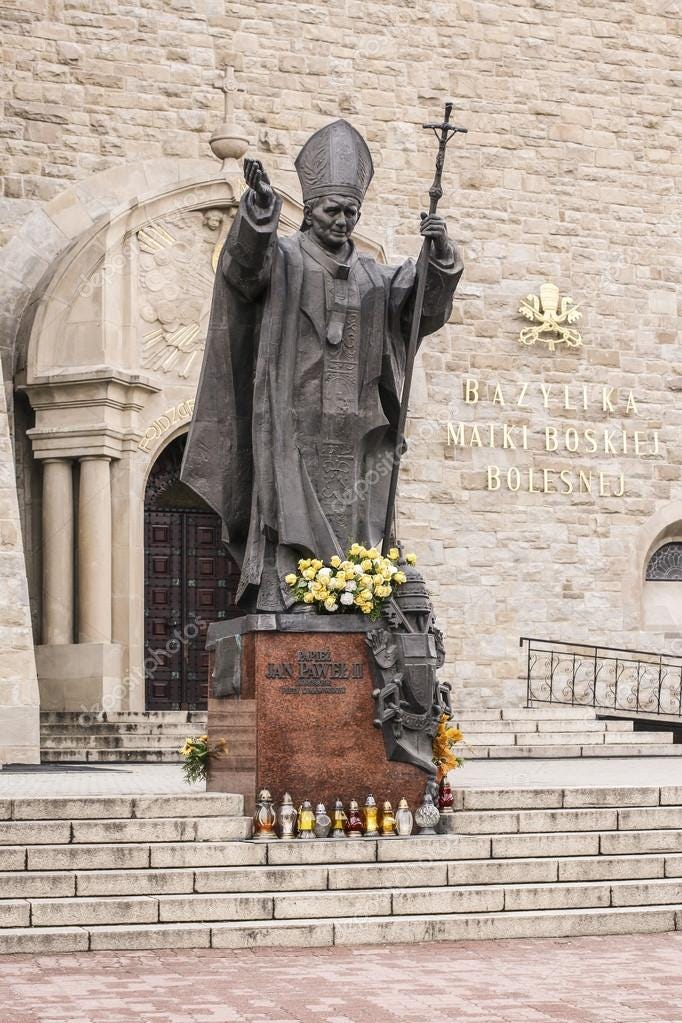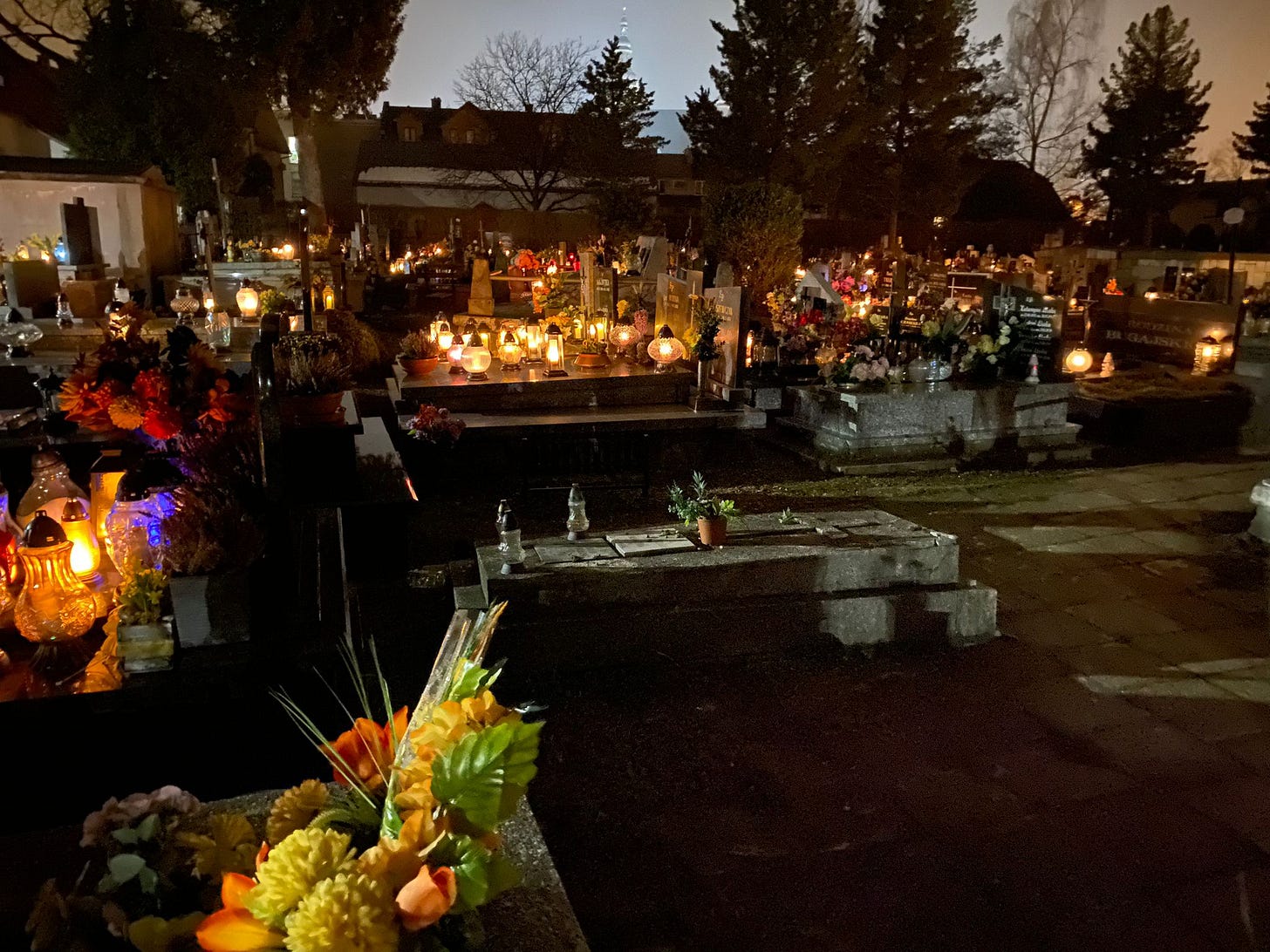I spent Easter Week in Poland. I hadn’t intended to be there at that specific time but that was how it worked out and I’m glad it did. Poland is, of course, a country closely linked to Ireland in, at least, two obvious ways. One is the enormous number of Polish people that now call Ireland a home. The second is religion - both countries being historically and culturally dominated by Christianity to a level that seems to separate them from their neighbours. That shared adherence to Catholicism perhaps reached its peak in each country’s devotion to the late Pope John Paul II - the first Polish Pope and the first Pope of any nationality to visit Ireland.
However, while there, it was not what linked us but what separated us that most struck me. The two countries may have an historical and cultural background in Christianity but only the vaguest and flimsiest adherence to it remains in Ireland which has been rapidly transitioning into a strongly secular country for some time now. This new difference between the two countries was driven home to me quite strongly on my last night in Poland.
I had arranged to meet a friend in the bar of my hotel that evening. However, being Holy Saturday, the bar turned out to be closed. Coming from Ireland, where I couldn’t imagine a business forgoing the chance to make money out of respect for a religious holiday, this was quite the surprise to me. So, we sat in the lobby wondering what to do. Eventually, we settled on walking into the local town hoping, rather optimistically, to find somewhere open. As it happens we did find somewhere and the night took a different course to the one I had expected.
Although all of the restaurants and bars were shut and the streets were cast in the kind of reverential gloom befitting the most holy week in the religious calendar, there was one building lit up and open - inviting music pouring from its doors. It was, of course, the Church.
And so, we made our way to it. Incredibly (or so it seemed to me), the building was crowded - people filling the lobby and even spilling outside. We (perhaps rudely) worked our way through this crowd until we found ourselves standing in the kind of Church that exists now only as an exception in Ireland - tourist attractions to continue the lie to the outside world that we are still a religious country. Around me ornate artwork covered the walls, gold and silver glinted on every furnishing, Easter decorations of flowers and gift offerings were attached to every pillar and every pew. The overriding impression was of a deeply loved and respected Church earnestly endeavouring to be worthy of hosting a Divine Presence. Bodies were packed tightly as every seat and every inch of floor had someone occupying it - each paying rapt attention to the ceremony. This was, as I learned later, a nearly three hour mass (we had entered halfway through) and everyone would likely be back in the morning for Easter Sunday itself. The makeup of the crowd was also remarkable to me - so many young faces in attendance, not just children accompanying their parents but young men and women on their own who felt their place in the world on that night was there in that Church.
It was the music though that really captured us. A haunting chorus of religious hymns sung with incredible passion and devotion. The voices of the choir were mystical and ghostly, rising up into the high ceiling and echoing and reverberating back down upon us. The lead singer turned out to be a professional opera singer and so the quality of the performance was actually disarming. We happily saw out the rest of the mass and when a phalanx of priests (many young themselves) came to administer communion to the numbers gathered, I did something I have not done in many years - I knelt down on the cold, hard floor along with everyone else and took communion on the tongue. After the mass ended and the crowd thinned a little, the choir continued to sing and we moved closer to them and gladly listened for another half an hour or so, still utterly bewitched and consumed by the sound.
Later, when we finally left the Church, we walked through the graveyard to find it, too, unexpectedly captivating. Before us, a sea of candles flickered in the darkness, each one an Easter tribute left by a family member to a departed loved one. Nearly every single grave was lit up as if a thousand fireflies had made the cemetery their home for the night so as to keep the dead company. After our experience in the Church, this was almost exhaustingly beautiful and we lingered for a time trying, in vain, to absorb the scene and the feeling of sheer reverence that was so alien to us.
Afterwards, I walked back to my hotel somewhat overcome by the whole experience. Was Ireland ever like this? In my youth I mostly attended mass in a school gymnasium that had about as much sanctity as a fraternity house. Recently, I have attended several funerals along with some preparation for my son’s communion; these have taken place in actual churches that were the same size as the one in Poland but felt like empty husks in comparison, devoid of meaning or substance - crass counterfeits of what a Church should be.
The thing is - I am not religious. I stopped going to mass when I was sixteen. Everything about the Church in Ireland seemed empty to me; empty of substance, of grace, and most importantly empty of God. And I am all too aware of the evils perpetuated by the Church in this country so this is not a call to return us to darker times in our past when the Church held dominion over us and often abused us. But still, there was something undeniably good about my experience on that Holy Saturday in Poland and the Church was at the heart of it. It produced that captivating ceremony, the spellbinding music and the quiet reverential beauty of the light-filled graveyard. But it also brought the town together in celebration of something beyond itself, where the mundane concerns of everyday life were put to one side and thoughts turned to the transcendent. This seems to me to be a fundamentally positive and important thing - opportunities to both commune with one’s neighbours and focus on something other than oneself increasingly rare in the modern world.
Do we have such things in Ireland? We certainly have a great many things. We have sport which perhaps, through its regular large gatherings in support of an external team or star, replicates something of what I describe above. Is it quite the same though? In my experience, stadiums are often adversarial environments and the subject of the crowd can quite often receive abuse and worship in equal measure. In many ways, insofar as it can be seen as a replacement for religion, the popularity of sport actually demonstrates the necessity of religion for people and society or, at least, the products of religion - communing and transcendent focus. Those needs didn’t disappear, they just moved to a different form. Again though, does sport fully achieve this? Can a hobby, a pastime that has been drenched in money and dressed up in imitation of religion, truly meet these apparently primal needs? And can it match my experience in Poland?
Speaking of money, Ireland also has plenty of that. We are awash in multi-national corporation tax dollars as giant tech companies like Facebook and Twitter use our island as their European base. The result is we have one of the highest average salary rates in Europe with oceans of discretionary cash floating through our society. Notwithstanding a housing crisis and a dysfunctional health service, we are an immensely wealthy country. But is that enough? Is material wealth and the boons it brings us sufficient? Would a trillion dollars sustain a country if its soul has been hallowed out or extracted and held captive in a painting in the attic?
I don’t know the answers to these questions but I do know that Ireland seems, to me, a less soulful place than Poland - whatever that term may mean. Religion is not the only way to enrich a country’s or a person’s soul but for a time, it seems to have been Ireland’s main way of doing so and it is not clear to me that we have properly replaced it in this new secular landscape.
Or maybe I’m just an antique. Still, I’ll remember that Easter night in Poland for a long time and it will continue to bother me that, despite our riches and luxuries, such things now seem like a lost artefact in my own country.





I keep finding reasons to tell people about you. Found another.
As someone else who stopped attending Mass in my teens, I have thought many times over the past year or two that we will eventually return to our faith in some shape or form. Not sure if it'll be oppressive Catholicism, but something. And I'm not sure when exactly but I think it will come.